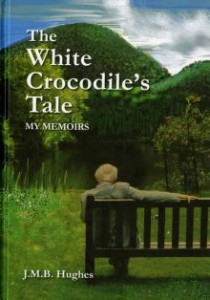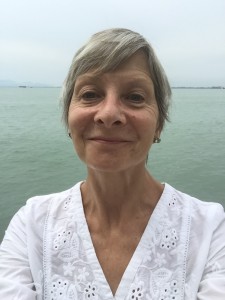Mary Hughes talks on her father Mike Hughes's Book during her recent Penang visit
https://www.facebook.com/arecabooks.page
Mary Hughes on J.M.B Hughes and “The White Crocodile’s Tale”
Caption: Mary Hughes talks about her father. Video taken in Areca Books. If the volume is too soft, turn on the subtitles.
Mary Hughes talks about her father JMB Hughes and his memoirs “The White Crocodiles’ Tale”
My Father, John Michael Broome (Mike) Hughes wrote his memoirs for life-long Malaysian friends and his family. He would not have written anything if he had not been pushed, so thank you to those who pushed hardest (you know who you are and several can hear me now!)
His children are proud to tell you we joined the plot, bought him a computer and taught him to use it!

but for whom he wrote matters.
First, because the memoirs are written with the playfulness of stories told after dinner to those held in closest affection and trust. Friendship was one of his core values because when he felt safe in friends, he could achieve so much more than he ever thought he could. I believe writing his memoirs made him realise this.
Second, in his eighties when he started writing, Mike was looking back over the best part of a century of relentlessly emerging change, invention, pain and marvels. One of the challenges for any story teller is to connect the past to the future – whilst living in the present.
And the 20th century is a challenge much written of. Dad’s stream of words swell a river of much wider interest than the audience he wrote for. I hope they will be valued in this way as much as for the memories they evoke. Many voices helping to make sense of the complexity of history.
“So, What is The White Crocodile’s Tale all about?”
(It is good NOT to have to explain what the crocodile thing is all about! British audiences don’t get that.)
It is the life of a middle-class British school teacher, committed to the code of good behaviour of his time, devoted to his wife, his family and community, that’s what.
“Another sentimental read about past times from a relatively privileged European cultural perspective?”
Well, if you wish, yes it is, but this one writer was delighted to be the last of the British (I was old enough to eves drop!) and thrilled to see the door of Merdeka flung open in peace (I too stood there out in the sun watching one flag go down and another go up watching the smiles on my Parents’ faces)
“So back to Friendship with its siblings, loyalty, trust and love.”
My Father was as hungry for affection and approval as we all are. He knew that of life’s drivers for change, many are painful, but none are so transformational and freeing as love.
“Well isn’t this exactly what our Sacred or philosophical texts tell us?”
Love for a person (my Parents had a very happy marriage) but also for Place with all its richness of scenery, peoples and cultures.
It was Place that began this love story…..
Supremely, Malaysia and the island of Penang.
What that taught, is that personal transformation may be less about a conscious decision to change and more about being relaxed, open and receptive, ready to be surprised by what really is good, trust it then working to sustain it – even over vast distances.

“The Hughes family are an odd bunch. I hope we are good entertainment to read about. But it is the Malaysians who stay with you once you put the book down.”
-Mary Hughes
-Mary Hughes
The cast of high-achieving, funny, bright, mischievous, talented and wholly honorable young people who enter the book in Chapter 5 with their schools, The Penang Free School, The Malay College and Sultan Ismail College, soon take it over and are there right to the end – as old men and women themselves.
Their delight in learning and their respect for knowledge, apparently so refreshing after their more war-jaded, pessimistic British contemporaries, prompts reflections on the importance of where and when you originate for potential to be set free and to flourish.
But potential has to be noticed first. I think my Father knew great potential when he met it realised that it fed on learning, which in turn fed on experience (Lankawi trips not endless theory!) and being allowed to get things wrong in safety so you can get them right when it matters.
And safety takes friends.
“well, in some respects he might have been a pioneer. A zillion modern business writers are growing rich on this stuff today!”
We travelled widely after our Malaysian days but no time else was ever quite like them. Nor the extraordinary, brilliant people we met there, and whose friendship was so generously offered to my Father and Mother and which became their happiest, most treasured gift in life, alongside family.
JMB Hughes, educator and star pupil
I suppose, the real question about education, leadership and realised potential raised in the Malaysian chapters of the White Crocodile’s Tale and referred to throughout the rest of Dad’s thinking is about exactly who it is doing most of the learning, when and why.
I often think the star pupil here was one JMB Hughes and he had many, many teachers. Learning is a two-way thing and to stop learning is to die.
The pain of life, war, hardship, we read, makes you doubt old traditions and slaps you wide awake to possibilities. But avoiding lazy, unhelpful choices means staying awake to constant learning and supporting the learning of others. This takes love.
Malaysia kept Dad awake for the rest of his life, sustained by friends, contacts and mutually helpful exchanges that never ceased. I believe he lived as long as he did, with steadfast spirit, intact mind and strong body because of it, and so my family have so much to be grateful to Penang and Malaysia for. Thank you so much.
Terima kasih banyak-banyak.
“The White Crocodile’s Tale” by J.M.B Hughes is now available at our bookshop at 15 Jalan Masjid Kapitan Keling (Pitt Street) and through our online bookshop!
To subscribe to our weekly book updates, email us at arecabooks@gmail.com
Brought to you by Areca Books
Brought to you by Areca Books

0 Comments:
Post a Comment
Subscribe to Post Comments [Atom]
<< Home